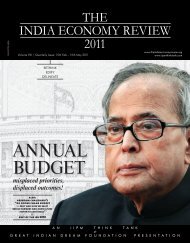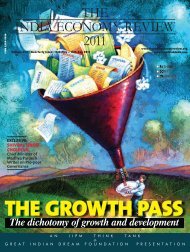Download - The India Economy Review
Download - The India Economy Review
Download - The India Economy Review
You also want an ePaper? Increase the reach of your titles
YUMPU automatically turns print PDFs into web optimized ePapers that Google loves.
nomic planning had entered the lexicon<br />
with a tilt on central planning and this<br />
implied driving the entire economic sys-<br />
tem of a nation in accordance with a cohesive<br />
plan made ready for the economy.<br />
This was in contrast to that which was<br />
underscored as competition, for competition<br />
referred to decentralized planning<br />
and wherein this planning was carried out<br />
by those who came onward to carry out<br />
transactions according to preferences that<br />
they had set up for themselves. As regards<br />
tying up the planning process with the<br />
existing knowledge, for that is what planning<br />
was supposed to deal with, it was to<br />
be decided as to which of the chosen systems<br />
turned out to be more effi cient to put<br />
into effect on hand existing knowledge.<br />
For it is with fuller exercise of existing<br />
knowledge that planning for the economy<br />
would work out to be the best for society.<br />
In terms of working out as to how this is<br />
to be carried out in the real frame of an<br />
economy, the germane question is the<br />
feasibility of doing so.<br />
Faced with this situation, the way forwards<br />
is to ask as to whether there would<br />
be success in transferring the knowledge<br />
that is dispersed among many individuals<br />
to a centralized authority such that this<br />
body can make decisions regarding allocation<br />
of resources. Note that in this case<br />
the data that is currently dispersed as<br />
knowledge amongst many individuals<br />
have to be fi rst transferred to the central<br />
agency. <strong>The</strong> knowledge data fl ow includes<br />
data that is related to even incremental<br />
changes that occur in the economic proc-<br />
ess. Economic transactions are entered<br />
into by individuals and by fi rms, and any<br />
participant in a transaction knows that<br />
incremental changes that constitutes the<br />
day to day level of activities come in a<br />
myriad of forms and very often do come<br />
with a compelling time constraint. <strong>The</strong><br />
knowledge data, in other words, has time<br />
relevance and that of place relevance too.<br />
<strong>The</strong>re is an essential relevance of incre-<br />
I NTEGRATED PLANNING<br />
mental changes in knowledge data. Incremental<br />
changes in knowledge data, a<br />
common place event of occurrence, represent<br />
a change in the state of the economic<br />
process and this change in the state<br />
is an important event that has to be provided<br />
for. A steady state situation that<br />
records no incremental changes could be<br />
a theoretician’s delight but a practitioner’s<br />
no-go situation. True as much as a steady<br />
state could be desirable, it still remains<br />
confi ned to an assumed state that is much<br />
away from the realities of economic life.<br />
<strong>The</strong> knowledge data under reference,<br />
then, is a sum total of all these changes. It<br />
is only on receipt of such knowledge data<br />
that the central agency responsible for<br />
economy wide planning can move ahead<br />
with the task of economic planning. <strong>The</strong><br />
resultant economic order is an output of<br />
the aggregation and integration of data<br />
received by the central planner and the<br />
actions that he initiates. A contra to this<br />
would be to determine the feasibility of<br />
transferring such additional knowledge as<br />
would be required to those who already<br />
had knowledge to start with such that<br />
these dispersed individual knowledge<br />
For it is with fuller exercise of existing<br />
knowledge that planning would<br />
work out to be the best for society<br />
holders could arrive at plans that are in<br />
sync with those their collaborating partners<br />
come up with. <strong>The</strong> point is as to<br />
which of the option would society expect<br />
to more likely succeed when relating to<br />
economic planning to start with and economic<br />
development as a consequence of<br />
the opted planning mode?<br />
Offer of Planning Options to<br />
THE INDIA ECONOMY REVIEW<br />
35





